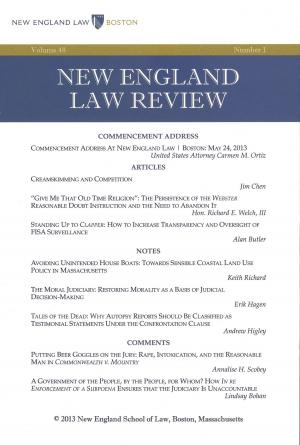Representing the Poor: Legal Advocacy and Welfare Reform During Reagan's Gubernatorial Years
Nonfiction, Reference & Language, Law, Legal Services, Legal History| Author: | Mark N. Aaronson | ISBN: | 9781610278621 |
| Publisher: | Quid Pro, LLC | Publication: | April 22, 2014 |
| Imprint: | Smashwords Edition | Language: | English |
| Author: | Mark N. Aaronson |
| ISBN: | 9781610278621 |
| Publisher: | Quid Pro, LLC |
| Publication: | April 22, 2014 |
| Imprint: | Smashwords Edition |
| Language: | English |
The empirical focus of this book is the contentious political and legal battle over California welfare reform in the early 1970s. It is an extended, multifaceted case study of a kind not much found in the literature on social cause lawyering. The narrative highlights the forceful presence of Ronald Reagan and the pivotal role in representing the welfare poor carried out by Ralph Santiago Abascal, a government-funded legal aid attorney. To counter Reagan’s welfare policy ambitions, Abascal with other legal services lawyers, and in joint cause with recipient-led welfare rights organizations, relied on court litigation not in isolation but as part of an overall strategy that also involved legislative and administrative actions. Within the context of American pluralism and constitutionalism and from an analytical perspective, this study examines the professional and institutional character of group legal representation for the poor as a strategy for political empowerment and social change. While grounded in political and legal history, the study’s conceptual approaches primarily draw on ideas from political science and political theory about representation and from writings in legal ethics and legal education on professional role responsibilities. The principal thematic points are: (1) Social cause lawyering is a systemic necessity for the democratic and equitable functioning of our governing institutions; (2) the client constraints on the role of lawyers for groups or causes have more to do conceptually with understandings about the nature of representation than the applicability of ethical or procedural rules; and (3) the political consequences of such legal advocacy are variable and potentially contradictory.
The empirical focus of this book is the contentious political and legal battle over California welfare reform in the early 1970s. It is an extended, multifaceted case study of a kind not much found in the literature on social cause lawyering. The narrative highlights the forceful presence of Ronald Reagan and the pivotal role in representing the welfare poor carried out by Ralph Santiago Abascal, a government-funded legal aid attorney. To counter Reagan’s welfare policy ambitions, Abascal with other legal services lawyers, and in joint cause with recipient-led welfare rights organizations, relied on court litigation not in isolation but as part of an overall strategy that also involved legislative and administrative actions. Within the context of American pluralism and constitutionalism and from an analytical perspective, this study examines the professional and institutional character of group legal representation for the poor as a strategy for political empowerment and social change. While grounded in political and legal history, the study’s conceptual approaches primarily draw on ideas from political science and political theory about representation and from writings in legal ethics and legal education on professional role responsibilities. The principal thematic points are: (1) Social cause lawyering is a systemic necessity for the democratic and equitable functioning of our governing institutions; (2) the client constraints on the role of lawyers for groups or causes have more to do conceptually with understandings about the nature of representation than the applicability of ethical or procedural rules; and (3) the political consequences of such legal advocacy are variable and potentially contradictory.















